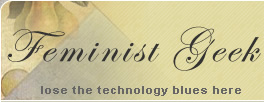Home >
tech support for gender & women's historians
The Internet has done more to break down geographical, cultural, and disciplinary borders than any political, social, or economic advance of the late 20th century. The Net's global digital reach muddies geographical border and encourages diverse, interdisciplinary, cross-cultural communication and collaboration. New technology tools provide powerful textual, visual, and communication resources for scholars. Yet the effective use of new digital technologies is generally given scant attention in graduate history programs.
Many historians have not had or made the time to take advantage of computers for their research and teaching. Many lack the institutional training and support to effectively learn and use the new media. As a result, asking a scholar to use technology is often akin to demanding that an academy award-winning actor not only act, but also to do her own set design, lighting, costuming, etc.
The resources on this site offers scholars, students, and others who visit this site an opportunity to expand their understanding and use of the new media. FeministGeek.com tries to be an accessible, comprehensive, and reliable online clearinghouse of current technological tools and resources. The site is dedicated to enabling site visitors to more easily use the web and new media in their research, teaching, and professional activities. Another equally important goal is to in some small way contribute to developing a global network of technologically savvy women's historians. Please explore, bookmark, return.
what you will find here....now and sooner or later
- A short article about Victoria Woodhull, the first woman to run for president of the US - in 1872.
- Online Bibliography - the short list.... an annotated bibliography of reputable and durable women's history primary and secondary online resources.
- Teaching and Learning - methods to use web and new media resources to facilitate teaching and learning about history, with examples of digital assignments for students and how to assess them, and practices to encourage academic integrity and discourage plagiarism.
- Community Building - tools to encourage online communication that serve as models for ways to use the web for professional and course communication. Currently a general overview, resources on email and discussion lists, and blogs - with FeministGeek blog (asynchronous) and instant messaging and conferencing with Breeze and iChat (synchronous). Wiki's are coming soon.
- Tutorials - for creating digital materials to enhance classroom and professional presentations. Currently - presentations (with PowerPoint), web pages, Dreamweaver, and a section about free web sites.
- Smart Searching - how to search efficiently and evaluate the trustworthiness of web sites. Nothing yet.
- Copyright Guidelines - respect electronic intellectual property when using online resources for teaching and professional presentations. A few resources.
- Safe Computing - keep your hardware and software working efficiently and safely, and ergonomic considerations to safeguard your personal health.
- Berks - information about the 2005 Berkshire Conference on the History of Women session on "crossing geography, culture, & time with technology - engaging in women's and gender history @ the turn of the 21st century." Finished.
- Bryn Mawr - Summer Institute for Women in Higher Education Administration, class of '02
- About - find out about this website's history and author/web manager; and a 12-step guide for becoming a feminist geek. Finished, for now.
NOTE - Many of the links on this website are gone or available only on the Internet Archives WayBackMachine; some have been updated to their newer URL. This site is scheduled for updating in 2023.
Susan Kullmann gratefully acknowledges UCLA's Center for the Study of Women, particularly Chris Littleton and Regina Lark, for support from 2004 to 2007 to develop this old website.
